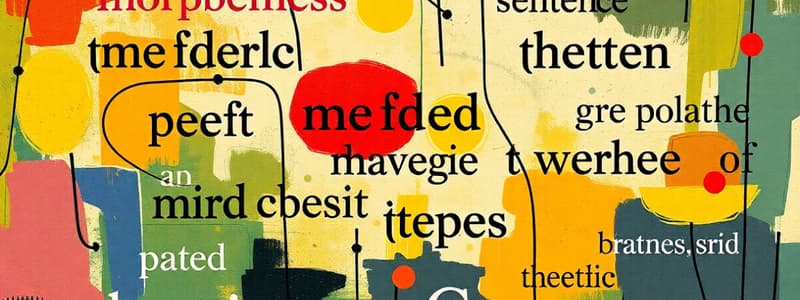Podcast
Questions and Answers
Which of the following best describes derivational morphemes?
Which of the following best describes derivational morphemes?
- They change the category of a word when added to another morpheme. (correct)
- They only indicate past tense.
- They do not change the category of a word when added.
- They are added to words for grammatical purposes, such as pluralization.
Inflectional morphemes change the category of a word when added.
Inflectional morphemes change the category of a word when added.
False (B)
The _________ morpheme is the part of the word that remains when all affixes are removed, carrying the principal meaning.
The _________ morpheme is the part of the word that remains when all affixes are removed, carrying the principal meaning.
base
What is the primary function of a declarative sentence?
What is the primary function of a declarative sentence?
Which of the following is an example of 'clipping' in word formation?
Which of the following is an example of 'clipping' in word formation?
In 'folk etymology,' an unfamiliar word or phrase is replaced by a more complex one over time.
In 'folk etymology,' an unfamiliar word or phrase is replaced by a more complex one over time.
What does a 'complex word' contain?
What does a 'complex word' contain?
Define 'blending' in the context of word formation and provide an example.
Define 'blending' in the context of word formation and provide an example.
Match the word formation process with the corresponding example:
Match the word formation process with the corresponding example:
Explain how derivational suffixes like '-ize,' '-ation,' and '-ity' can change the category of a word, providing an example transformation.
Explain how derivational suffixes like '-ize,' '-ation,' and '-ity' can change the category of a word, providing an example transformation.
Flashcards
Derivational Morphemes
Derivational Morphemes
Morphemes that change a word's category when added, like turning a noun into a verb.
Inflectional Morphemes
Inflectional Morphemes
Morphemes that add grammatical information without changing the word's category (e.g., plural 's', past tense 'ed').
Base Morpheme
Base Morpheme
The main part of a word that carries the principal meaning, remaining after removing affixes.
Declarative Sentence
Declarative Sentence
Signup and view all the flashcards
Word
Word
Signup and view all the flashcards
Simple words
Simple words
Signup and view all the flashcards
Complex words
Complex words
Signup and view all the flashcards
Invention
Invention
Signup and view all the flashcards
Clipping
Clipping
Signup and view all the flashcards
Blending
Blending
Signup and view all the flashcards
Study Notes
- These are short notes on morphemes, sentences and some examples
Derivational Morphemes
- These morphemes change the category of a word
- A noun can become a verb, or an adjective can change to an adverb, for example, active
Inflectional Morphemes
- These morphemes do not change the category of a word.
- They are utilized for grammatical purposes
- Examples include plural s or past tense ed
Base Morpheme
- This is the part of a word that carries the principal meaning
- It is what remains of a a word once all affixes are removed
Declarative Sentence (Statement)
- These are the most commonly used sentences
- It is the most basic sentence among all 4 types of sentences
- They are used to convey messages, facts, and ideas to declare something and forward information
Word
- A word is a free morpheme or combination of morphemes forming a basic speech segment
Simple Words
- Consist of a single free morpheme
Complex Words
- Contain either two bound forms or a bound and a free form as their constituents
Compound Words
- These have two free forms as their constituents
Invention
- New words are invented and added to the English vocabulary.
Clipping
- Words are formed by cutting off the beginning or end of a word, or both, without changing the meaning or grammatical class
- It is shortening a word
Blending
- This is the fusion of two words into one, usually the first part of a word with the last part of another
Folk Etymology
- This is the change in a word or phrase over time from replacing an unfamiliar form with a more familiar one
Free Morphemes
- These can stand independently as a word, with its own meaning
Bound Morphemes
- These do not have meaning by themselves and lack independent existence
Echoism
- This is the formation of words where the sound suggests the meaning
Antonomasia
- This is the formation of a common noun, verb, or adjective form of the name of a person or place
Compound Sentences
- These are made of two or more independent clauses
- Are joined by a coordinating conjunction or sometimes by either a linking word or semicolon (;)
Complex Compound Sentences
- A complex-compound sentence contains one or more dependent clauses
- It has at least two independent clauses joined together with coordinating conjunctions
- Includes a comma immediately before the coordinating conjunctions
Studying That Suits You
Use AI to generate personalized quizzes and flashcards to suit your learning preferences.



